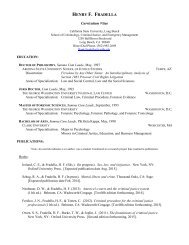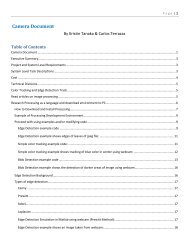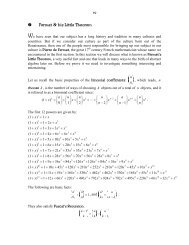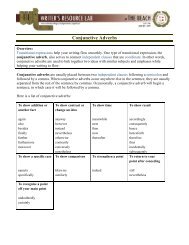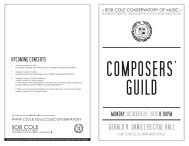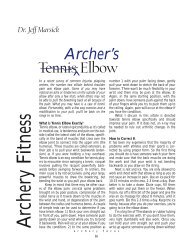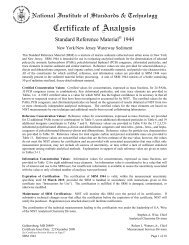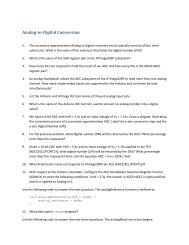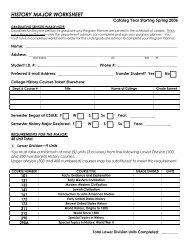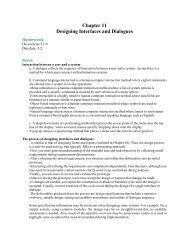Untitled - California State University, Long Beach
Untitled - California State University, Long Beach
Untitled - California State University, Long Beach
Create successful ePaper yourself
Turn your PDF publications into a flip-book with our unique Google optimized e-Paper software.
narrative begins by informing the reader that Jonathan is attempting to<br />
help Alex change the way he speaks and writes English. In doing so, he<br />
eventually succeeds in making Alex’s English sound a little less like he<br />
was born behind the Iron Curtain. The change in Alex’s English is most<br />
obvious in the epistolary narrative. For example, in the same letter in<br />
which Alex assures Jonathan that he has adopted Jonathan’s suggested<br />
alterations to the hotel scene, he also makes special note of the word<br />
“obligated,” underlining it and adding in parentheses, “thank you,<br />
Jonathan.” Previously, when Alex has tried to use the word “obligated,”<br />
he has written “oblongated.” After he makes this correction, he ceases to<br />
misspell the word both in his letters and in his novel chapters. Similarly,<br />
in another letter, Alex writes, “I attempted to guess some of the things<br />
you would have me alter, and I altered them myself. For example, I did<br />
not use the word ‘spleen’ with such habituality, because I could perceive it<br />
made you nerves by the sentence in your letter when you said, ‘Stop using<br />
the word ‘spleen.’ It’s getting on my nerves’” (54). “Spleen” is perhaps<br />
Alex’s most frequently (and incorrectly) used word, both in his journey<br />
narrative and in his letters. He uses the word as a synonym for “annoy.”<br />
After this point, he ceases using the word in his letters—a noticeable<br />
difference, considering the frequency with which he uses it before.<br />
There is only one example of Jonathan’s direct impact on Alex’s voice<br />
in the journey narrative. After many letters have been exchanged, Alex<br />
has adapted his voice to be a more accurate representation of American<br />
English. Because each of his journey chapters are drafts that have not<br />
yet been edited by Jonathan, any improvement in his English must be a<br />
result of counseling from Jonathan’s letters. Apart from the omissions and<br />
alterations Alex made, there is one sole example of Alex self-editing, which<br />
occurs toward the end of the novel: “But I understanded understood<br />
that the silence was necessary for him to talk” (Foer 157). Alex’s selfediting<br />
shows that his correspondence with Jonathan is altering how he<br />
30 | Mehlinger<br />
writes and speaks English. In a previous chapter, “A Very Rigid Search,”<br />
Alex writes a line of dialogue in which he says, “You understanded me,<br />
yes?” demonstrating that he did not know the correct past-tense form<br />
of “understand” before (113). This is also the only instance in the entire<br />
novel in which a word is crossed out, making it visibly jarring and<br />
noticeable to the reader. Foer likely crossed out the word for two reasons:<br />
first, to remind the reader that what we are seeing is a work in progress,<br />
and, second, to alert the reader to the fact that as a result of Jonathan’s<br />
tutoring, Alex has begun to better understand the rules of the English<br />
language.<br />
The most apparent complication of voice in Everything Is Illuminated<br />
is that the author is a character within the book in which he is writing one<br />
of the narratives. That the character, Jonathan, is writing only one of the<br />
narratives is inherently problematic, as it is his name on the book’s cover.<br />
The sections the character does write are not directly about him but are<br />
fictional histories of his ancestors. In these sections, we only occasionally<br />
hear snippets of Jonathan’s voice via authorial intrusion. These are mere<br />
flashes, however, and they reveal little more than explanations of familial<br />
relations. We first realize that Jonathan is in fact writing the fictional<br />
Trachimbrod narratives when, at the end of the second chapter entitled<br />
“The Lottery, 1791,” the chapter ends with a moment of authorial intrusion.<br />
“We were to be in good hands,” Jonathan interjects, in reference<br />
to Brod being placed in the care of Yankel D (Foer 22). At the end of<br />
the next section of the Trachimbrod narrative, Jonathan interjects again.<br />
“He [Yankel D] had been given a baby, and I a great-great-great-greatgreat-great-grandfather,”<br />
he writes, thereby explaining his relationship to<br />
Yankel D and to the baby, Brod (42). Jonathan only ever intrudes into the<br />
narrative to explain things, such as clarifying his relationships to people<br />
within the story or on rare occasion to make a short commentary like<br />
“We were to be in good hands.” He does not provide any extensive com-<br />
Mehlinger | 31



